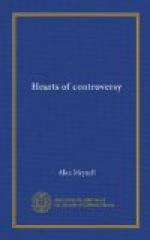Are we the better artists for our preference of the waiting-woman? It is a strange claim. The search for the beauty of the less-beautiful is a modern enterprise, ingenious in its minor pranks, insolent in its greater. And its chief ignobility is the love of marred, defiled, disordered, dulled, and imperfect skies, the skies of cities.
Some will tell us that the unveiled light is too clear or sharp for art. So much the worse for art; but even on that plea the limitations of art are better respected by natural mist, cloudy gloom of natural rain, natural twilight before night, or natural twilight—Corot’s—before day, than by the artificial dimness of our unlovely towns. Those, too, who praise the “mystery” of smoke are praising rather a mystification than a mystery; and must be unaware of the profounder mysteries of light. Light is all mystery when you face the sun, and every particle of the innumerable atmosphere carries its infinitesimal shadow.
Moreover, it is only in some parts of the world that we should ask for even natural veils. In California we may, not because the light is too luminous, but because it is not tender. Clear and not tender in California, tender and not clear in England; light in Italy and in Greece is both tender and clear.
When one complains of the ill-luck of modern utilities, the sympathetic listener is apt to agree, but to agree wrongly by denouncing the electric light as something modern to be deplored. But the electric light is the one success of the last century. It is never out of harmony with natural things—villages, ancient streets of cities, where it makes the most beautiful of all street-lighting, swung from house to opposite house in Genoa or Rome. With no shock, except a shock of pleasure, does the judicious traveller, entering some small sub-alpine hamlet, find the electric light, fairly, sparingly spaced, slung from tree to tree over the little road, and note it again in the frugal wine-shop, and solitary and clear over the church portal.
Yet, forsooth, if yielding to the suggestions of your restless hobby, you denounce, in any company, the spoiling of your Italy, the hearer, calling up a “mumping visnomy,” thinks he echoes your complaint by his sigh, “Ah, yes—the electric light; you meet it everywhere now; so modern, so disenchanting.” It is, on the contrary, enchanting. It is as natural as lightning. By all means let all the waterfalls in all the Alps be “harnessed,”




